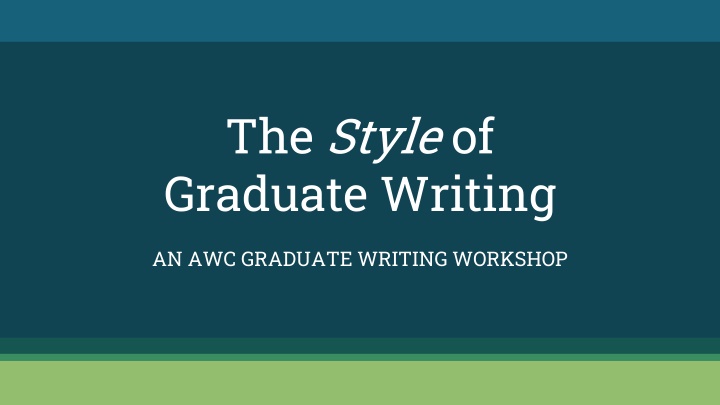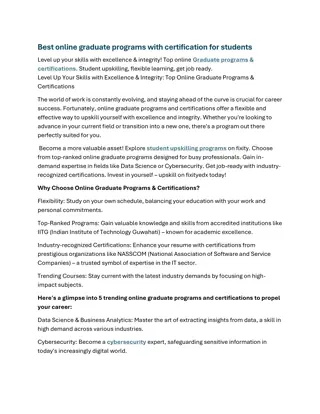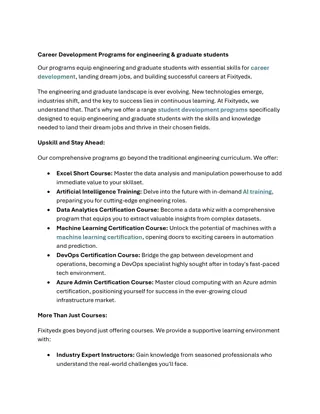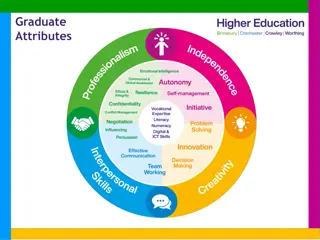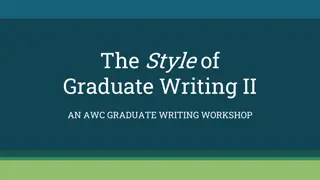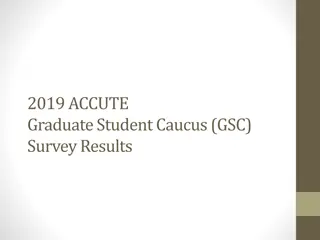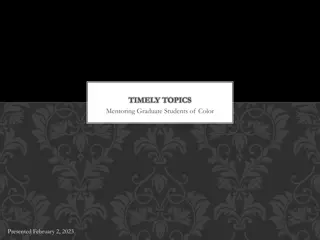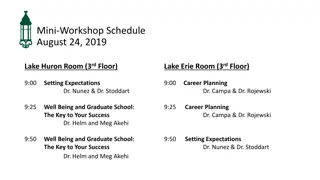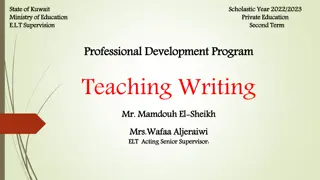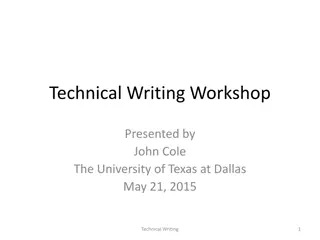Enhancing Graduate Writing Skills: A Workshop Overview
In this workshop led by Graduate Assistant Brooke Boling, the focus is on distinguishing between good graduate and undergraduate writing styles. Emphasis is placed on structure, clarity, purpose, voice, and word choice. Participants learn to state their purpose clearly, write effective thesis statements, and enhance the overall quality of their graduate-level writing. The session highlights the importance of consistent constructions, transitional phrases, and avoiding wordiness.
Download Presentation

Please find below an Image/Link to download the presentation.
The content on the website is provided AS IS for your information and personal use only. It may not be sold, licensed, or shared on other websites without obtaining consent from the author.If you encounter any issues during the download, it is possible that the publisher has removed the file from their server.
You are allowed to download the files provided on this website for personal or commercial use, subject to the condition that they are used lawfully. All files are the property of their respective owners.
The content on the website is provided AS IS for your information and personal use only. It may not be sold, licensed, or shared on other websites without obtaining consent from the author.
E N D
Presentation Transcript
The Style of Graduate Writing AN AWC GRADUATE WRITING WORKSHOP
Welcome! My name is Brooke Boling My name is Brooke Boling I am the Graduate Assistant for the AWC. You can reach me at bolingbe@ucmail.uc.edu 2
Good Graduate Writing vs. Good Undergrad Writing Graduate Level Expectations Undergraduate Expectations Clear, engaging, stylistic Clear Presents new information Does not necessarily add anything new Moves seamlessly between points Relies on transition phrases Written for a professional audience Written for general audience/teacher Structure determined by content Follows prescribed structure Confident, articulate, and clear voice Adopted tone Incorporates thorough research Meets minimum citation requirements 3
Today's Focus: Structure/Clarity Structure/Clarity Stating purpose Sentence structure & modifiers Consistent constructions Transitional phrases Voice Voice Word choice Wordiness Parallel structure Active/passive voice 4
1 Structure & Clarity Stating purpose, sentence structure & modifiers, consistent constructions, transitional phrases 5
Stating Your Purpose State your purpose/thesis early early Think of your reader what do you want them to know? What are you contributing contributing? Not what you did, but what you found found 6
Stating Your Purpose Just a conclusion: My results show that sharks are smarter than humans. The facts that lead to a conclusion: Results show that x is greater than y, thus sharks are smarter than humans. 7
Stating Your Purpose Thesis Statements Summarize what your argument is, and why it is important Use as a roadmap for the rest of your paper Make a debatable claim, not a statement of fact Focus on a single topic 8
Sentence Construction 1 or 2 ideas per sentence Our findings suggest a practice-induced tradeoff in auditory processing rather than a general improvement that benefits perceptual dimensions relevant for survival at the expense of those that are less relevant. Our findings suggest that practice does not lead to a general improvement in auditory processing. Instead, practice leads to a bias that speeds up processing in some dimensions (e.g., pitch) only at the cost of delaying processing in other dimensions (e.g., loudness). 9
Sentence Construction Start with old info, end with new info New -> Old "The collapse of a dead star into a point perhaps no larger than a marble creates a black hole." Old -> New A black hole is created by the collapse of a dead star into a point perhaps no larger than a marble." 10
Modifiers Words, phrases, or clauses that add descriptions to words Should be next to (in front or behind) the word they describe Dangling modifiers occur when there is a modifier, but no target word. Misplaced modifiers occur when a modifier is placed too far away from the word it should describe. 11
Modifiers Examples of sentences with dangling modifiers: Hungry, the leftover pizza was devoured. Rummaging in her giant handbag, the sunglasses escaped detection. Fix by rearranging sentences and adding target words: Hungry, we devoured the leftover pizza. Rummaging in her giant handbag, Dolores failed to find her sunglasses. 12
Modifiers Examples of sentences with misplaced modifiers: Churning in the Atlantic Ocean, we anxiously watched the weather report for information about the hurricane. Humphrey wore his one collared shirt to the job interview, which was unfortunately stained with mustard. Fix by moving the modifier next to the target word: We anxiously watched the weather report for information about the hurricane churning in the Atlantic Ocean. Humphrey wore his one collared shirt, which was unfortunately stained with mustard, to the job interview. 13
Consistent Constructions Consistent constructions let the reader know what to expect. Examples of consistent constructions: In this essay I will address issues A, B, and C and then you address those issues in the stated order Our first hypothesis was proven and then subsequent paragraphs begin the same way, e.g. Our second hypothesis was not proven 14
Transitional Phrases Transitional words & phrases help carry a thought from one sentence to another, from one idea to another, or from one paragraph to another. Transitional devices link sentences and paragraphs together smoothly so that there are no abrupt jumps or breaks between ideas. 15
Transitional Phrases To Add: To Add: To Compare: To Compare: To Prove: To Prove: and, again, and then, besides, equally important, finally, further, furthermore, nor, too, next, lastly, what's more, moreover, in addition, first (second, etc.) whereas, but, yet, on the other hand, however, nevertheless, on the contrary, by comparison, where, compared to, up against, but, although because, for, since, for the same reason, obviously, evidently, furthermore, moreover, besides, indeed, in fact, in addition, in any case, that is To Show Exception: To Show Exception: To Repeat: To Repeat: To Emphasize: To Emphasize: yet, still, however, nevertheless, in spite of, despite, of course, once in a while, sometimes in brief, as I have said, as I have noted, as has been noted definitely, extremely, obviously, in fact, indeed, in any case, absolutely, positively, naturally, surprisingly, always, forever Full list available via Full list available via Purdue OWL Purdue OWL 16
2 Voice Word choice, wordiness, parallel structure, active/passive voice 17
Word Choice Common problems: Unclear pronouns Unnecessary jargon/technical language Words with unintended connotations Undefined or general terms Clich s Verb issues 18
Word Choice Unclear pronoun: Unclear pronoun: My dog Tiny licked my friend Dan, even though he doesn t like him all that much. Revised: Revised: My dog Tiny licked my friend Dan, even though Tiny doesn t like Dan all that much. 19
Word Choice Unnecessary jargon/technical language: Unnecessary jargon/technical language: "The dialectical interface between 'dog people' and 'cat people' in amorous relationships offers an algorithm for understanding interpersonal compromise." Revised: Revised: "Communication between 'dog people' and 'cat people' in romantic relationships is a model for understanding compromise." 20
Word Choice Words with unintended connotations: Words with unintended connotations: The accommodations were cheap but comfortable. Revised: Revised: The accommodations were inexpensive but comfortable. 21
Word Choice Undefined or general terms: Undefined or general terms: Society teaches us that pink is only for girls. Revised: Revised: Contemporary American culture, including media and advertising, teaches children that pink is only for girls. 22
Word Choice Clich s: Clich s: Scholars agree to disagree about the age of the universe. Revised: Revised: Scholars disagree about the age of the universe. 23
Word Choice: Verb Issues Avoid making verbs and adjectives into nouns. The marine biologists engaged in an argument about the chemical properties of jellyfish. Revised: Revised: The marine biologists argued about the chemical properties of jellyfish. The students handled the jellyfish with great carelessness. Revised: Revised: The students carelessly handled the jellyfish. To fix, double-check your nouns and consider replacing nominalized nouns with an action verb. 24
Word Choice: Verb Issues Weak verbs (e.g. to be or have ). Trees have an effect on the community landscape. Revised: Revised: Trees beautify the community landscape. To fix, locate the weak verbs in your sentence and replace with more specific and descriptive verbs. 25
Tips for Effective Word Choice When you re writing and can t think of the right word, just put in the best word you can think of, highlight it, and return to find the best word. If you can t think of the right word, try rewriting the entire sentence. Ask yourself if you are using the strongest nouns, verbs, and adjectives is there a replacement that is more specific or accurate? Explain your argument aloud in your own words compare what you say to what you wrote and ask if your writing is as clear as how you d explain it while speaking. Read your work aloud to hear if it sounds awkward, redundant, or unclear. Use a thesaurus with caution look up replacement words in the dictionary to make sure they mean what you want them to mean. 26
Wordiness Common problems: Excessive qualifiers (e.g. really, mostly, very, etc.) Redundant words Excessive prepositions (e.g. of, to, at, etc.) Wordy stock phrases (e.g. It is crucial that ) 27
Wordiness Excessive qualifiers: A lot of sharks often think that fish are really quite tasty. Revised: Most sharks think fish are tasty. Redundant words: The ocean looked gorgeous and beautiful at sunset. Revised: The ocean looked beautiful at sunset. Excessive prepositions: The fish in the ocean to the north of the coral fell prey to the traps set by the boat from the fishing company. Revised: The fishing company s traps captured fish north of the coral. 28
Wordiness Stock Phrases: The reason for because, since, why Due to the fact that In light of the fact that Considering the fact that On the grounds that Despite the fact that Although, even though Regardless of the fact that 29
Parallel Structure Parallel structure means using the same pattern of words to show that two or more ideas have the same level of importance. This can happen at the word, phrase, or clause level. The usual way to join parallel structures is with the use of coordinating conjunctions such as "and" or "or." A sentence is parallel when each phrase or clause has the same grammatical structure Fix nonparallel sentences by adjusting verb or noun that is unlike the others in the clause/phrase 30
Parallel Structure Words & Phrases Words & Phrases Not Parallel: Mary likes hiking, swimming, and to ride a bicycle. Clauses Clauses Not Parallel: Coach told us that we should get a lot of sleep, that we should not eat too much, and to do warm-up exercises before the game. Lists Lists Not Parallel: The dictionary can be used to find these: word meaning, pronunciation, and looking up irregular verbs. Parallel: Mary likes hiking, swimming, and riding a bicycle. Parallel: Coach told us that we should get a lot of sleep, not eat too much, and do some warm-up exercises before the game. Parallel: The dictionary can be used to find these: word meaning, pronunciation, and irregular verbs. 31
Active/Passive Voice Active voice: Direct, concise Emphasizes who to did/said what and to whom Passive voice: Emphasizes the process, materials, or objects, instead of the actor May help connect sentences more clearly 32
Active/Passive Voice Active voice (the subject does the action): The baseball player hit the ball over the fence. Passive voice (the subject is acted upon): The ball was hit over the fence by the baseball player. Active voice: We added water to the test tube. Passive voice: Water was added to the test tube. Tip: Check your "to be" Tip: Check your "to be" verbs: verbs: am, is, are, was, were, be, being, been am, is, are, was, were, be, being, been 33
Tone Too formal/affected: Too formal/affected: Trying to sound intelligent may get in the way of expressing your intelligent academic discoveries Too informal: Too informal: Slang or colloquialisms could distract from the smart point you are trying to make The goal is to communicate your ideas effectively, not to show how well you can write with an academic tone Informality could lead to the writer thinking less about precise word choice and effective structure 34
Thank you! Langsam 401N uc.edu/awc 513.556.3912 Appointments available Monday Thursday: 9am 8pm Friday: 9am- 5pm Drop-in available Monday Friday: 10am 4pm 35
Works Cited Grammar Bytes "The Dangling Modifier "The Misplaced Modifier" "Parallel Structure Association for Psychological Science "Teaching Graudate Students How to Write Clearly The Writing Center at UNC-Chapel Hill Word Choice + Wordiness "Style Williams, J.M. (2007). Style: Lessons in clarity and grace (9th ed.). New York: Pearson Longman. Purdue OWL 36
